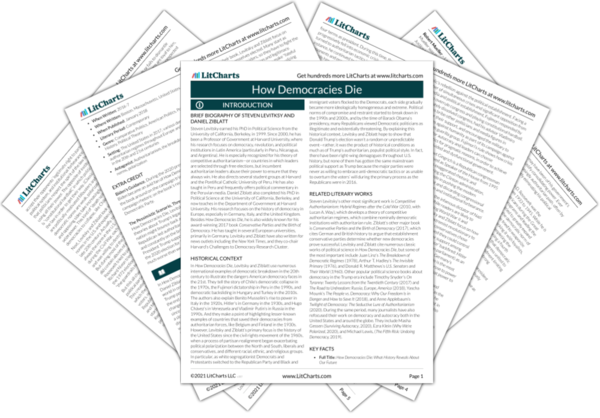Alberto Fujimori Quotes in How Democracies Die
A cast of political outsiders, including Adolf Hitler, Getúlio Vargas in Brazil, Alberto Fujimori in Peru, and Hugo Chávez in Venezuela, came to power on the same path: from the inside, via elections or alliances with powerful political figures. In each instance, elites believed the invitation to power would contain the outsider, leading to a restoration of control by mainstream politicians. But their plans backfired. A lethal mix of ambition, fear, and miscalculation conspired to lead them to the same fateful mistake: willingly handing over the keys of power to an autocrat-in-the-making.

Unlock explanations and citation info for this and every other How Democracies Die quote.
Plus so much more...
Get LitCharts A+Although some elected demagogues take office with a blueprint for autocracy, many, such as Fujimori, do not. Democratic breakdown doesn’t need a blueprint. Rather, as Peru’s experience suggests, it can be the result of a sequence of unanticipated events—an escalating tit-for-tat between a demagogic, norm-breaking leader and a threatened political establishment.
[…]
Many [demagogues] do eventually cross the line from words to action. This is because a demagogue’s initial rise to power tends to polarize society, creating a climate of panic, hostility, and mutual distrust. The new leader’s threatening words often have a boomerang effect. If the media feels threatened, it may abandon restraint and professional standards in a desperate effort to weaken the government. And the opposition may conclude that, for the good of the country, the government must be removed via extreme measures—impeachment, mass protest, even a coup.

Alberto Fujimori Quotes in How Democracies Die
A cast of political outsiders, including Adolf Hitler, Getúlio Vargas in Brazil, Alberto Fujimori in Peru, and Hugo Chávez in Venezuela, came to power on the same path: from the inside, via elections or alliances with powerful political figures. In each instance, elites believed the invitation to power would contain the outsider, leading to a restoration of control by mainstream politicians. But their plans backfired. A lethal mix of ambition, fear, and miscalculation conspired to lead them to the same fateful mistake: willingly handing over the keys of power to an autocrat-in-the-making.

Unlock explanations and citation info for this and every other How Democracies Die quote.
Plus so much more...
Get LitCharts A+Although some elected demagogues take office with a blueprint for autocracy, many, such as Fujimori, do not. Democratic breakdown doesn’t need a blueprint. Rather, as Peru’s experience suggests, it can be the result of a sequence of unanticipated events—an escalating tit-for-tat between a demagogic, norm-breaking leader and a threatened political establishment.
[…]
Many [demagogues] do eventually cross the line from words to action. This is because a demagogue’s initial rise to power tends to polarize society, creating a climate of panic, hostility, and mutual distrust. The new leader’s threatening words often have a boomerang effect. If the media feels threatened, it may abandon restraint and professional standards in a desperate effort to weaken the government. And the opposition may conclude that, for the good of the country, the government must be removed via extreme measures—impeachment, mass protest, even a coup.











